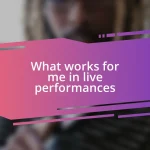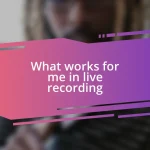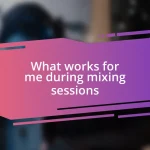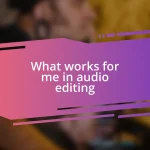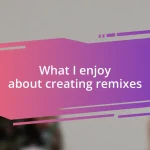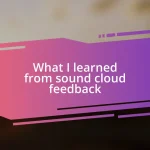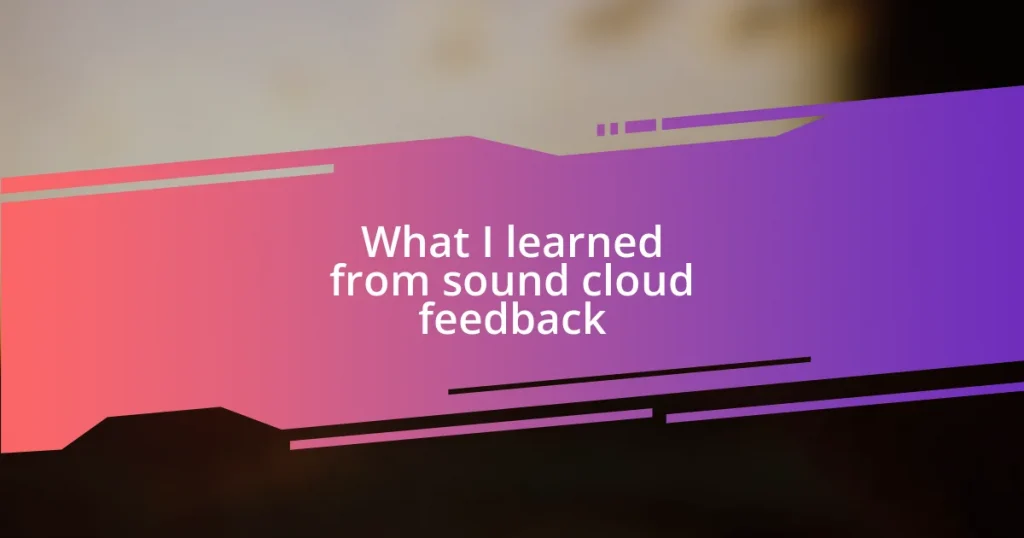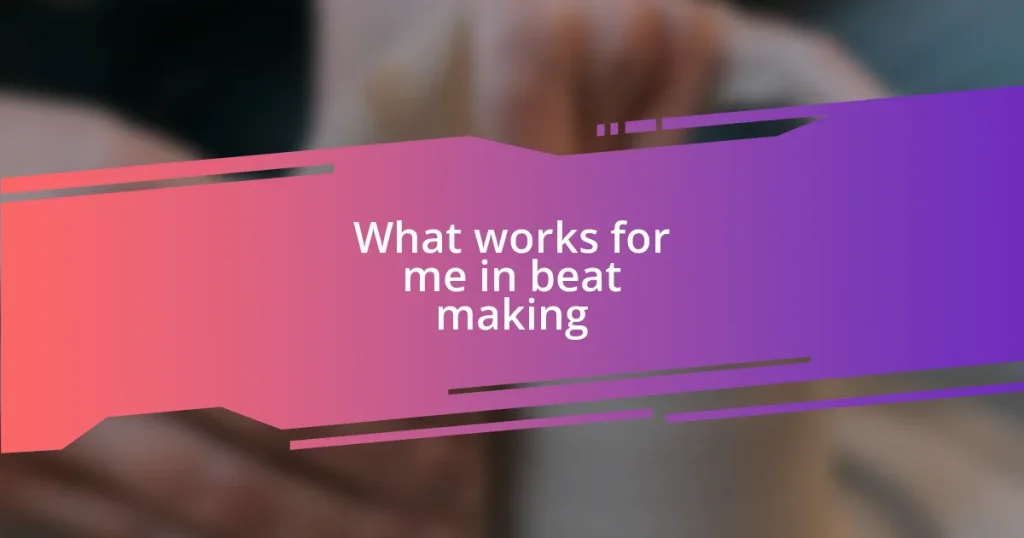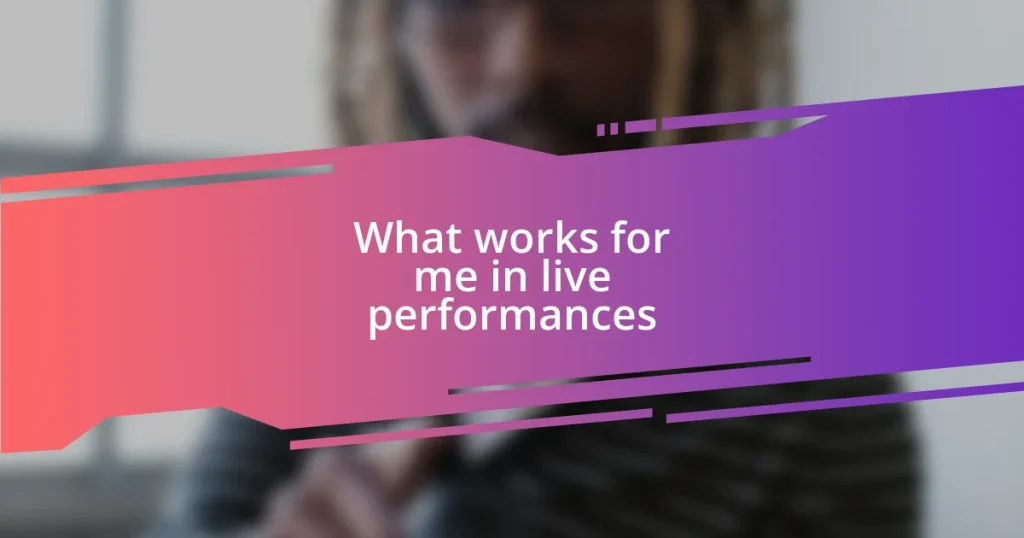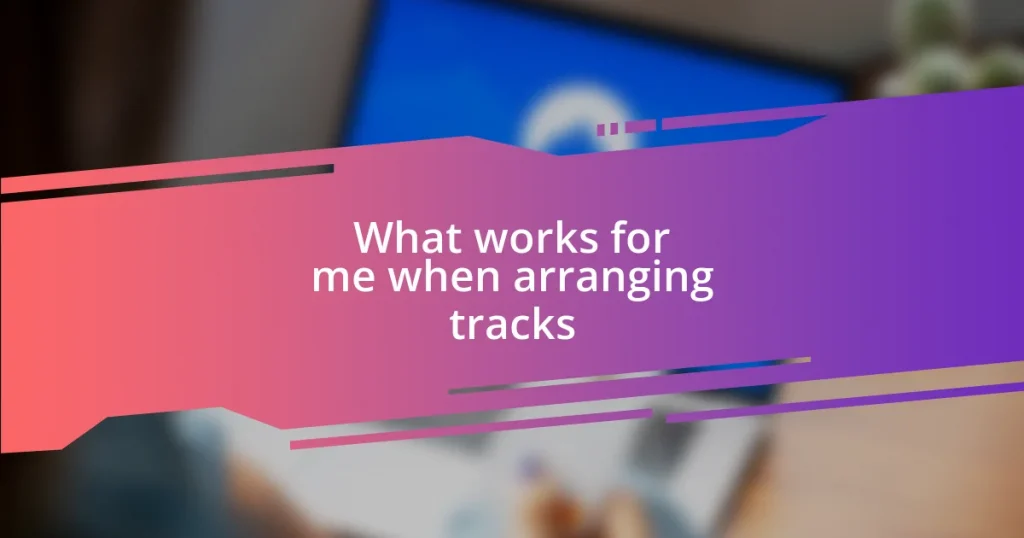Key takeaways:
- Constructive feedback from listeners can profoundly enhance artistic expression and guide improvement by revealing emotional connections and audience preferences.
- Engaging with the audience fosters a sense of community and offers fresh perspectives that can inspire new creative directions and interpretations of one’s work.
- Regularly analyzing progress and setting specific goals based on listener feedback and engagement metrics helps refine music and boost growth as an artist.
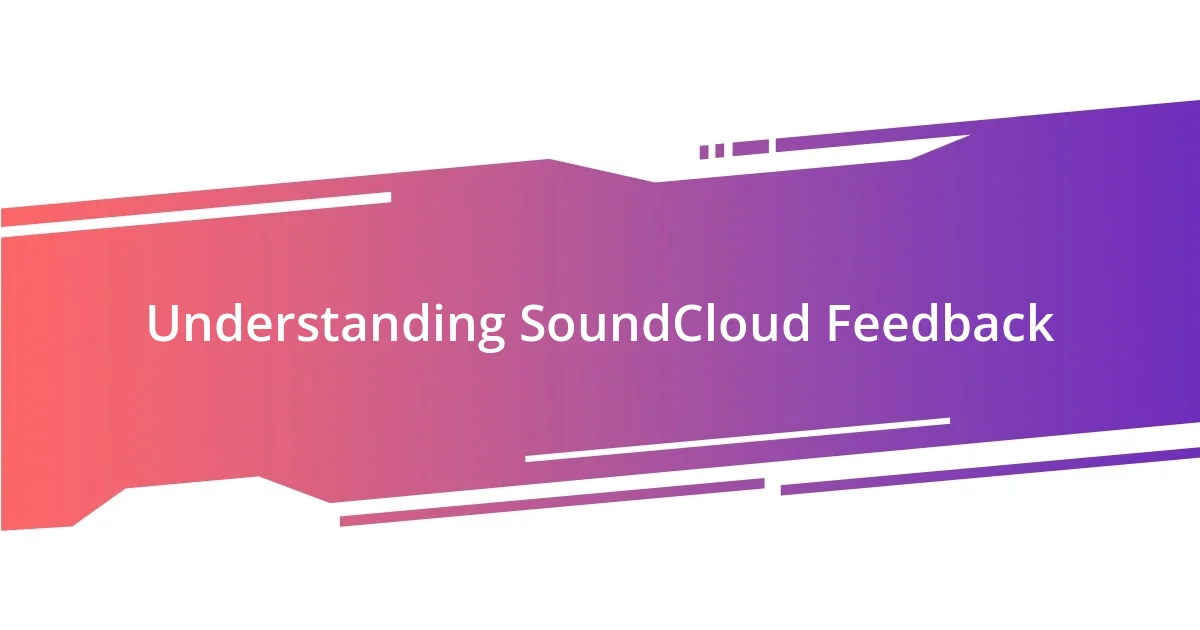
Understanding SoundCloud Feedback
When I first ventured into sharing my music on SoundCloud, I was struck by the diverse feedback I received. It wasn’t just about praise or criticism; each comment felt like a piece of the puzzle, revealing what my listeners connected with or where I could improve. Have you ever wondered how a simple comment could transform your artistic approach? I found that sometimes, the most constructive feedback came from unexpected places, like a casual listener who felt a deep emotional resonance.
I remember a particularly poignant critique I received on one of my tracks. The listener said they felt a sense of nostalgia, yet they also suggested a more defined bassline to really bring the energy up. This duality in feedback opened my eyes to the delicate balance between artistic expression and listener expectation. It made me think: how often do we overlook the power of someone else’s perspective?
Moreover, engaging with the feedback left me reflecting on my own sonic choices. It dawned on me that those comments weren’t just opinions; they were conversations encouraging me to explore new dimensions of my music. Have you ever felt that rush when someone’s insight aligns with your creative vision? It’s moments like these that remind me how feedback can be a catalyst for growth, pushing us to refine our craft and deepen our connection with our audience.
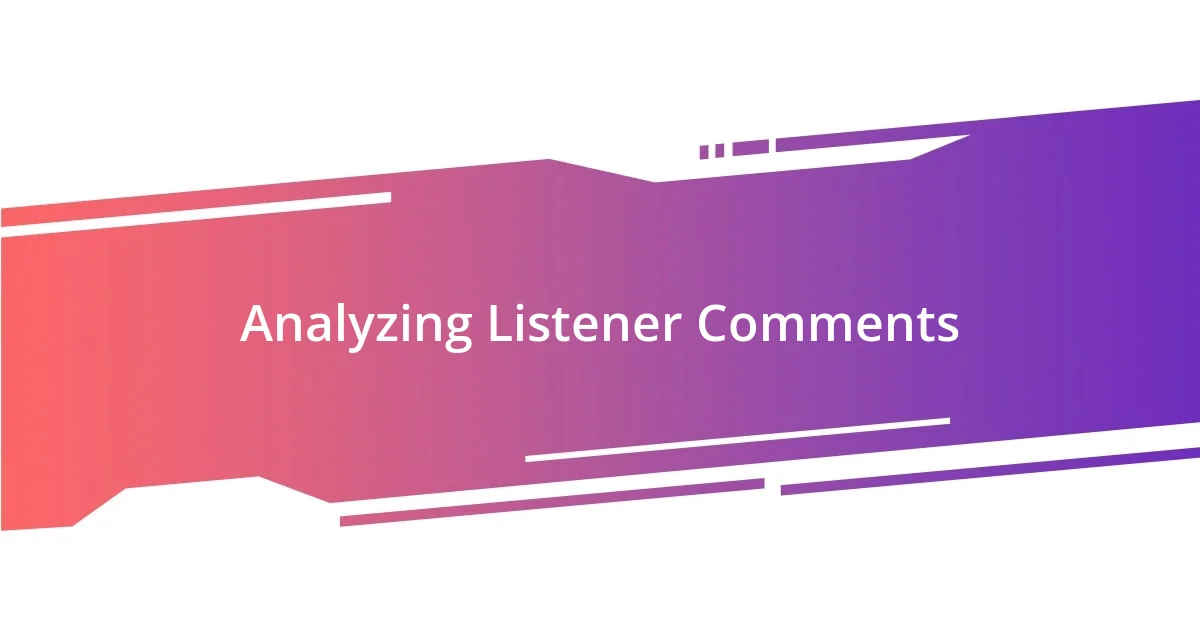
Analyzing Listener Comments
Analyzing listener comments on SoundCloud is like uncovering hidden treasures. Each feedback snippet reveals unique viewpoints that can reshape your creative journey. For instance, I once received a comment about a song’s tempo that caught me off guard — a listener felt the track would resonate more if it were just a beat faster. This opened my eyes to how timing can dramatically affect an emotional response.
In the mix of comments, I often noticed patterns that clarified my audience’s preferences. I remember the time I released a rendition of a classic song, and while many praised the originality, others missed the essence of the original melody. It taught me that while experimentation is vital, it’s just as crucial to honor the roots of what inspires you. This exchange not only guided my subsequent tracks but also deepened my appreciation for the listener’s perspective.
When I dissect listener comments, I consider their emotional context. For example, feedback on a therapeutic piece often highlighted listeners’ personal struggles, illustrating how my music served as a soundtrack to their experiences. Understanding this connection drives home the point that every comment holds potential for growth and a deeper bond with my audience.
| Listener Feedback Insights | My Personal Experience |
|---|---|
| Comments often highlight specific elements that resonate. | A listener suggested a quicker tempo, revealing how small changes impact emotions. |
| Patterns show audience preferences—balancing originality and familiarity. | Critiques on a cover taught me to honor the spirit of the original while bringing new ideas. |
| Emotional context behind comments can indicate deeper connections. | Feedback on a therapeutic track highlighted how my music resonates with listeners’ personal stories. |
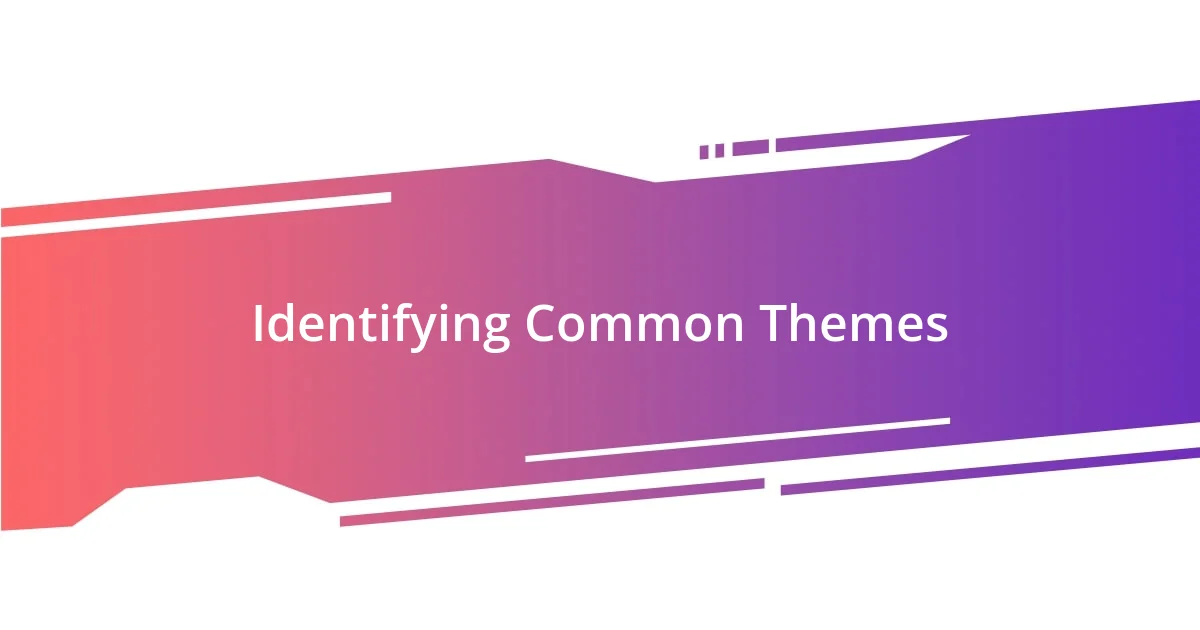
Identifying Common Themes
Identifying common themes in SoundCloud feedback has been eye-opening for me. I often reflect on how listeners perceive the emotional layers in my music. For instance, one listener remarked that my song reminded them of a sunlit summer day. This comment resonated with me deeply, as it pointed to moments in my life when I, too, sought warmth and joy through music.
Here are a few common themes I identified in feedback:
- Emotional Resonance: Many listeners connect with the nostalgia or joy my songs evoke.
- Production Quality: Comments frequently mention clarity and depth in the mix, guiding my technical decisions.
- Song Structure: Suggestions about transitions and dynamics often resurface, helping me shape better listening experiences.
I’ve learned that paying attention to these recurring comments isn’t just about absorbing criticism; it’s about understanding a shared language between myself and my audience. I vividly recall a time when a user expressed that a specific bridge in one of my tracks left them in tears. That moment made me realize how powerful a single musical choice can be. Engaging deeply with this feedback allowed me to embrace those elements that truly resonate, refining my artistry in the process.
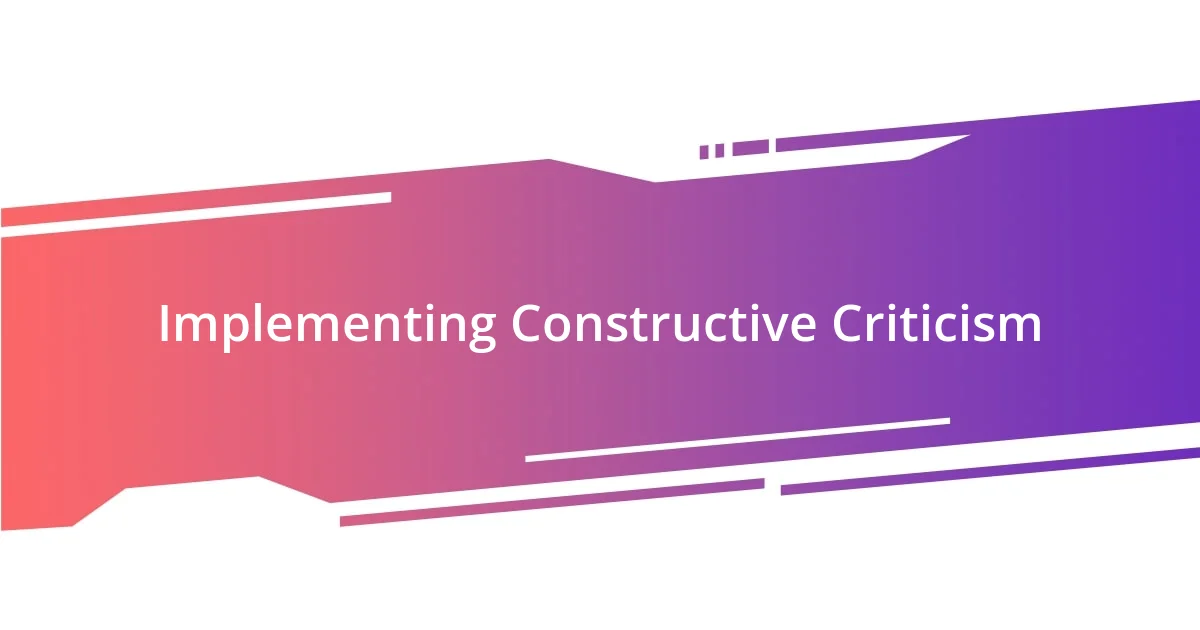
Implementing Constructive Criticism
Implementing constructive criticism has been a game-changer in my creative process. Whenever I receive feedback, I dive into it with an open mind. For instance, a listener once pointed out that a particular vocal delivery felt too rushed. This comment hit home; it reminded me of a time when I hurried through a performance due to nerves. By slowing it down, I not only improved that track, but also embraced a more genuine expression in my overall work.
I often find that translating feedback into actionable changes is where the real growth happens. After a detailed review, I decided to revisit some of my older tracks and apply the insights I gathered. I remember experimenting with layering harmonies differently based on a suggestion—what a revelation that was! The final version transformed into something rich and textured, much more than I had envisioned. Isn’t it fascinating how a simple suggestion can lead to unexpected artistic discoveries?
Listening to feedback isn’t just a mechanical process; it’s about evolving my artistry. Sometimes, I wonder if the criticism is revealing something I wasn’t ready to acknowledge. I recall a piece where a listener’s comment about the lack of energy in the chorus sparked an overhaul. That shift opened up a whole new sound for me—a vibrant, exhilarating addition that completely redefined that song. Embracing constructive criticism allows me to push boundaries and refine my music in ways I never thought possible.
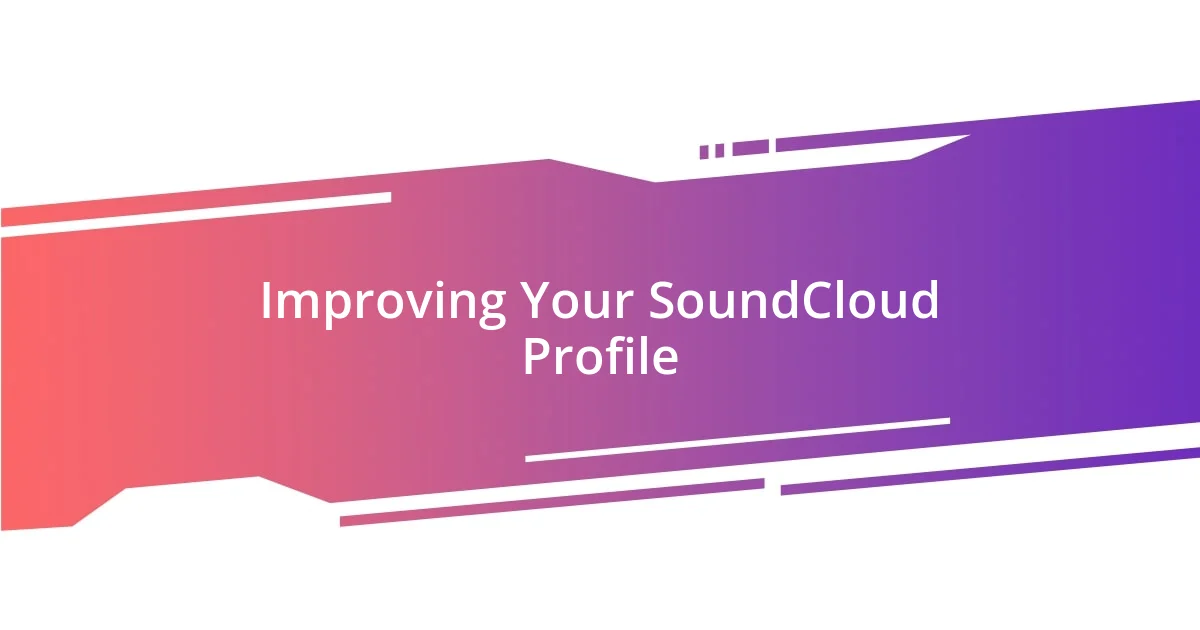
Improving Your SoundCloud Profile
Improving your SoundCloud profile is as vital as the music you create. I found that spending time on an engaging bio can significantly impact a listener’s first impression. When I revamped mine, I added a personal touch, sharing my musical journey and the stories behind my tracks. It’s amazing how a few well-chosen words can create a connection with my audience, inviting them into my world.
Furthermore, the choice of visuals is often underestimated. I learned the hard way that album art speaks volumes; I recall one of my tracks had a simplistic cover. After changing it to something more vibrant that captured the theme of the song, I noticed an uptick in plays and engagement. Why wouldn’t I want to entice listeners right from the first glance? It made me realize that visual elements are an extension of my artistic identity.
Lastly, I strongly urge artists to regularly update their tracks and playlists. I always glance back at older songs and think about how far I’ve come since then. Updating those tracks or even remixing them encourages listeners to revisit my profile and experience my growth. How does your music evolve? That’s a question I continually ask myself, and it’s reflected in my SoundCloud presence, creating a dynamic space that reflects my artistry.
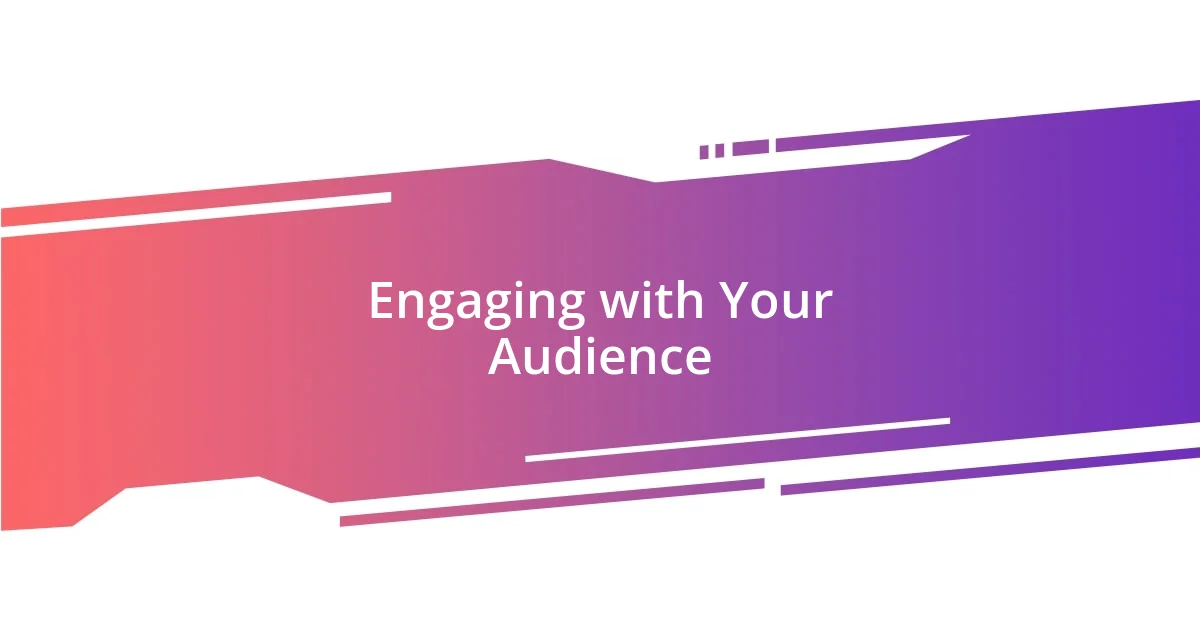
Engaging with Your Audience
Engaging with my audience has always been a priority for me. I remember the first time a listener left a comment that resonated deeply, asking about the inspiration behind a track I released. I took the time to respond, sharing my thought process and the emotional journey I experienced while creating it. That simple interaction opened up a dialogue that not only made the listener feel valued but also expanded my understanding of how my music interacts with others.
I’ve learned that creating a sense of community is key. Once, I hosted a Q&A session after releasing an EP, and the feedback was eye-opening. People were eager to share their interpretations—some of which I hadn’t even considered! These conversations ignited a new excitement in my work and offered fresh perspectives that I could incorporate into my future pieces. How often do we overlook the vast pool of ideas found in our listeners’ thoughts?
Deliberately seeking feedback on social media has proven invaluable. I remember posting snippets of a nearly finished track and asked for thoughts on certain elements. The responses were varied yet enlightening. One listener’s suggestion about adding a subtle synth line inspired me to explore a new dimension in my music. Embracing these connections transforms my creative process, making it a shared experience. Isn’t it wonderful to realize that engaging with your audience can enhance your artistry in ways you never anticipated?
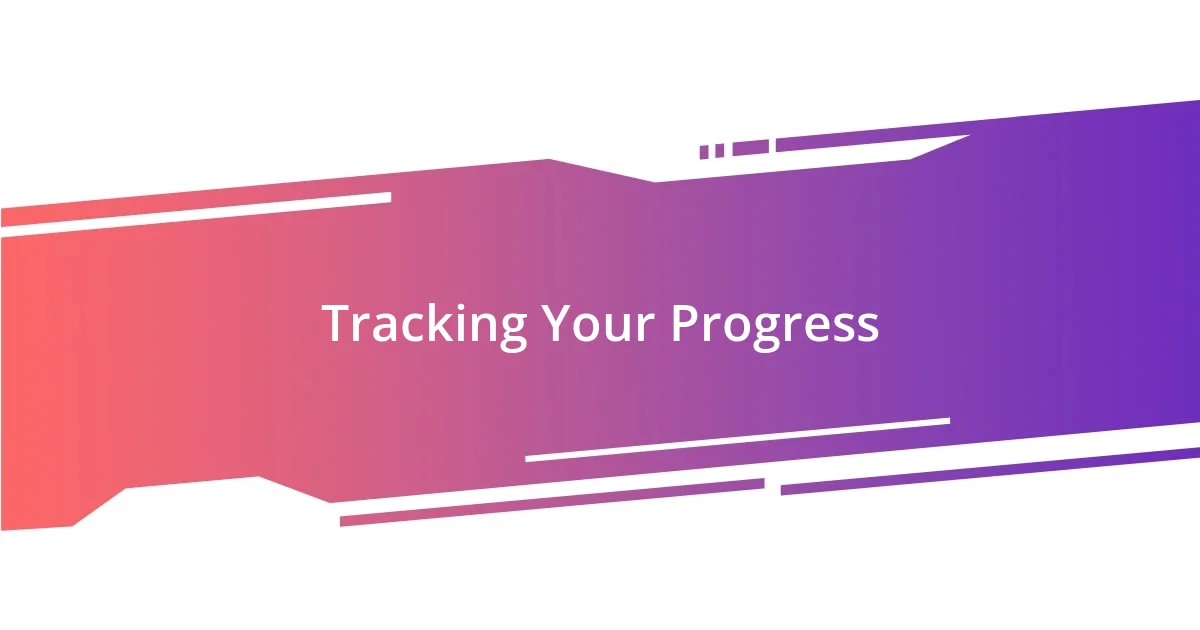
Tracking Your Progress
Tracking my progress on SoundCloud has been a game-changer for my music journey. Initially, I simply uploaded tracks and hoped for the best, but when I started analyzing my plays and engagement metrics, I was astonished at what I discovered. For instance, I found that tracks I thought would resonate often didn’t, while others surprised me with their popularity. Do others also have this experience where their expectations don’t align with reality? It certainly got me thinking deeper about my craft.
To keep tabs on my growth, I started setting monthly goals based on my analytics. I remember one month, I aimed to increase my follower count by 20%, and by focusing on more targeted engagement—like collaborating with other artists and sharing behind-the-scenes content—my strategy paid off. Seeing my follower count climb was not just a number; it was validation and motivation to keep evolving. Have you ever set goals that lit a fire under you? That’s exactly how it felt.
Moreover, I often turn to listener feedback to gauge the impact of my work. There was a track I released that received mixed reviews. Instead of being discouraged, I took a step back and invited honest critiques. The insights I garnered were invaluable. One listener described how the song’s theme resonated during tough times, and that reminded me of the true power of music to heal and connect. I wonder—how often do we overlook the depth of the emotional connections tied to our compositions? Each piece of feedback truly illuminates a path for growth, guiding me to refine my sound further.

